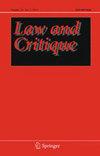Digital Humanitarian Mapping and the Limits of Imagination in International Law
IF 0.8
Q2 LAW
引用次数: 0
Abstract
Abstract Humanitarian maps assembled using digital technology are indicative of transformations underway in how the world is made knowable, sensible, and actionable, including for international legal purposes. These transformations are exemplified by the Missing Maps Project (MMP), an initiative of the Humanitarian OpenStreetMap Team, a U.S.-registered non-profit, and three other non-governmental organisations operating internationally: American Red Cross; British Red Cross; and Médecins Sans Frontières. Projects such as the MMP make it harder for international lawyers to lay claim to, and seek to imaginatively reorient, shared repositories of common sense. Meanwhile, international legal scholars continue to propagate ideas that the world may be reimagined with their help, largely without regard to such transformations. In lieu of imagination’s standard evocation to the end of enhancing critical agency in international legal writing, this article contends that the idiosyncratic notion of imagination advanced in the writings of Walter Benjamin may be better attuned to ongoing shifts in sense-making apparent in international humanitarian mapping. Walter Benjamin’s atypical rendering of imagination as a ‘purely receptive, uncreative’ force in a field of technological reproduction offers international legal scholars another way of thinking about agency and prospects for re-forming their field in the face of its burgeoning digitalisation.数字人道主义制图与国际法想象的极限
使用数字技术组装的人道主义地图表明,世界如何变得可知、明智和可操作,包括出于国际法律目的,正在发生变化。失踪地图项目(Missing Maps Project, MMP)是在美国注册的非营利组织人道主义开放地图小组(Humanitarian OpenStreetMap Team)的一项倡议,它还包括另外三个在国际上运作的非政府组织:美国红十字会(American Red Cross);英国红十字会;和无国界医生组织。像MMP这样的项目使得国际律师更难以宣称拥有共同的常识宝库,并寻求富有想象力的重新定位。与此同时,国际法律学者继续传播这样一种观点,即在他们的帮助下,世界可能会被重新构想,而在很大程度上没有考虑到这种转变。本文认为,在瓦尔特·本雅明(Walter Benjamin)的著作中提出的独特的想象力概念,可能会更好地适应国际人道主义绘图中明显的意义构建的持续变化,而不是以提高国际法律写作中的关键机构为目的的标准唤起。沃尔特·本雅明(Walter Benjamin)将想象力非典型地描绘为技术复制领域中“纯粹接受性、非创造性”的力量,这为国际法律学者提供了另一种思考代理的方式,以及面对迅速发展的数字化重塑其领域的前景。
本文章由计算机程序翻译,如有差异,请以英文原文为准。
求助全文
约1分钟内获得全文
求助全文
来源期刊

LAW AND CRITIQUE
LAW-
CiteScore
2.30
自引率
25.00%
发文量
19
期刊介绍:
Law and Critique is the prime international critical legal theory journal. It has been published for 20 years and is associated with the Critical Legal Conference. Law and Critique covers all aspects of legal theory, jurisprudence and substantive law that are approached from a critical perspective. Law and Critique has introduced into legal scholarship a variety of schools of thought, such as postmodernism; feminism; queer theory; critical race theory; literary approaches to law; psychoanalysis; law and the humanities; law and aesthetics and post-colonialism. Postmodern jurisprudence, law and aesthetics and law and psychoanalysis were pioneered in Law and Critique which remains the most authoritative international source for these schools of thought. Law and Critique is keen to translate and incorporate non-English critical legal thought. More specifically, Law and Critique encourages the submission of articles in the areas of critical legal theory and history, law and literature, law and psychoanalysis, feminist legal theory, critical race theory, law and post-colonialism; postmodern jurisprudence, law and aesthetics; legal phenomenology; and law and autopoiesis. Past special issues include: ''Critical Legal Education''; ''The Gender of Law''; ''Law and Postmodernism''; ''Law and Literature''; ''Law and Post-colonialism'', ''Law and Theatre''; ''Jean-Luc Nancy and Law''; ''Agamben and Law''. Law and Critique is ranked amongst the top 20 per cent of law journals by the Australian Research Council.
 求助内容:
求助内容: 应助结果提醒方式:
应助结果提醒方式:


